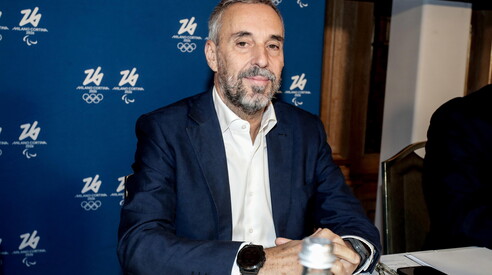It's not just the Milan-Cortina Games. An interview with Andrea Varnier.


PHOTO Ansa
The sports paper
“The legacy of the Olympics will be to make people understand how much sport can improve us. Having planted this seed and seeing it sprout would be the most beautiful thing,” the CEO of Milan-Cortina 2026 tells us less than 100 days before the start of the Olympics.
On the same topic:
"Today we feel more pressure than yesterday and less than tomorrow. It's the feeling of being less than 100 days away from the start." Andrea Varnier, the CEO of Milano-Cortina, isn't impressed by the countdown. He had already experienced it in Turin, twenty years ago, even though back then he was only working on the Ceremony. "At this point, we were already settled in the stadium to work on the inauguration, which we can't do here. It's difficult to make a comparison, but I can say we're more or less where I hoped to be, although I can't deny that the work on the Santa Giulia Arena is a bit behind schedule, and we had to postpone the test event from December to January. But this also has its positives, because by then the infrastructure around the facility will also be ready, and we won't have to completely replace the ice before the Games."
Seeing the bright side of negativity is a valuable skill when you know that in less than a hundred days, the world will be watching. The Italian National Olympic Committee (CONI) relies on a precise number to determine whether the Games are a success or not. President Buonfiglio hopes for 19, two more than Beijing; forecasts put us at 18. Regardless, that's the benchmark. For those organizing the Olympic Games, however, other factors come into play: "The home team's results are crucial to determining whether the Games were a success. But for us, there are also many other variables: the satisfaction of the athletes, not just the Italian ones, who need to find the ideal conditions to compete; the right atmosphere, the Olympic atmosphere, which in a large Olympics like ours is perhaps more difficult to achieve. Then, of course, we need to generate visibility, business, and tourism."
Sponsors are increasing at a rate of a couple a week , and there are many major national brands, but there's a bitter taste in the mouth for those who didn't want to jump on the Olympic bandwagon, missing out on an opportunity that comes around once every twenty years (if all goes well). There are more than 130,000 volunteers , many more than expected ("Sinner helped us at the beginning, but I don't think anyone who asked us in recent months even remembered that he was the spokesperson"). All or almost all of the tickets will eventually be sold ("demand is high"). The final financial statement still suggests a balanced budget at the end of the Games ("we are required to break even and we are monitoring the situation because certain delays complicate things"). For now, in short, there are no alarming signs. The much-discussed and criticized Cortina bobsleigh track is already up and running and could even become an example: "It is cooled with glycol instead of ammonia, and the recovered heat will be used to heat a neighborhood in Cortina." The 2026 Games should not leave the skeletons of Turin (the bobsleigh track and the ski jump): “This is certain because we have redeveloped existing facilities and in Milan we will leave as a legacy an arena that didn't exist and the Olympic village for students”.
Varnier's smile widens further when he reads the latest survey submitted to him by one of the IOC's longtime partners: "A Visa study, conducted in collaboration with Ipsos, tells us that nearly 80 percent of residents in the affected areas have expressed interest in the Games, and the vast majority of those interviewed, over 90 percent, expect positive impacts on the region. These are extraordinary figures." These figures heighten a sense of responsibility. "In Cortina, Livigno, Anterselva, and the other venues, the Olympic atmosphere is already palpable. In Milan, we'll have to wait, but that's normal. But as early as Christmas, when some partners' installations are activated, a bit of Olympic spirit will begin to permeate the air. Our great challenge is this: to make everyone feel the Olympic spirit. I'm sure the city of Milan will react as it always has to major events, and the fact that Casa Italia (in Milan, it will be at the Triennale) will be open to the public is certainly a great idea."
Milan-Cortina has a particular ambition: it wants to become a reference model for the future: "The world will also be watching us for this, starting with the opening ceremony that will see the teams parade together in Milan and Cortina. It's a model I believe we'll see again in other Winter Games, and perhaps even in the Summer Games. We wanted to involve all the athletes, and we'll do it. We're used to seeing two screens at the same time, superimposing two things. Technology today allows us to do that. It's an added complication, but we had to do it for the athletes, who remain the center of the Games." The hot topic less than a hundred days from the start can be summed up in one question: "What will remain of Milan-Cortina?" Varnier has no doubts: " I hope that, first and foremost, it will remain a fond memory , and that everyone, like in Turin, can say, 'They were great Games.'" But perhaps this is more of a personal wish. Then there will be a lot of infrastructure left to do. And I hope that the work done in recent years in schools, universities, and among young people can convey the Olympic spirit and the message that sport is one of the levers for improving human society in the broadest sense of the word... Having planted this seed and seeing it flourish would be the most beautiful thing."
It also demonstrates once again that when Italy sets its mind to organizing something, it manages to do it well, often even better than others. CONI President Buonfiglio said it's like being at a premiere at La Scala, where before the curtain rises, everything seems up in the air, and then the wonder sets in. "We'll keep tightening bolts until the opening ceremony and in the days afterward, the important thing is that it doesn't show on stage."
More on these topics:
ilmanifesto





